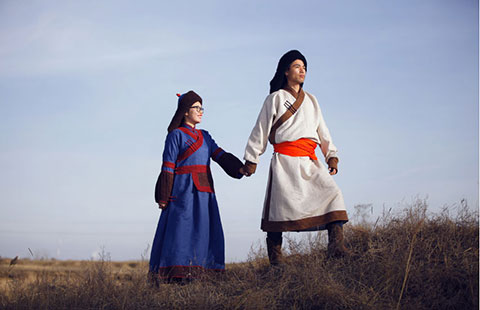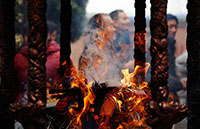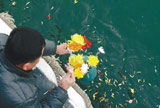The Sinoscape
By Jesse Glass (chinadaily.com.cn) Updated: 2016-03-01 17:07China Daily website is inviting you to share Chengdu Story with us! and here are some points that we hope will help contributors:
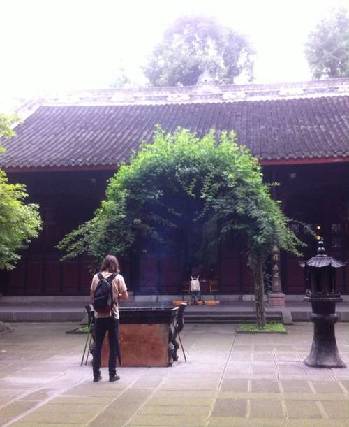
"Sichuan is the most peculiar place that I have ever been to in my life. I am yet to figure out why. I've been here for two and a half months and there is some strange atmosphere swaddling my daily life. When I figure it out, you will be told. But for now I'm hopelessly bewildered. This is only the second time I have written since arriving in Chengdu. I also haven't read a word of the 6 novels I brought with me. There is some unearthly vacuum here that takes plans made with intension and replaces them with cultural detours that almost escape the capabilities of the written word. Luckily, I have so far found the written word to be limitless. It always evolves when required to. So Chengdu poses a problem which calls for another small evolution of the written word. A new word is required. One which will accurately describe this moonscape of spice and slow life. Originally I was thinking Chengdu-ness but that's too simple. Too brash. I have recently become more fond of "Sichuanity". It's grittier and let's be honest, it at least has some poetry to it."
I wrote those words nearly 17 months ago. I still haven't read a single word of the 6 novels I brought with me and after posting one piece to my blog, quickly removed it. I have stalled. My interest in literature has not disappeared but simply failed to be front of mind. It's as if all things important to me have been lightly bathed in a turpentine solution of all that is Chengdu. Not destroyed, but decayed. Gently assisted in having their vitality removed. Don't take all this as a negative. Change and difference are as liberating as they are debilitating.
Conversely my chilli tolerance is at record highs and I'm using the pinyin input method to facilitate correspondence with Chinese friends and acquaintances. I have gained more understanding of the world I unwittingly happened upon, yet I am still baffled by what happened to my priorities in the land of the hotpot. The landmark occurrence of the last 17 months is that Sichuanity has been usurped by a new term and I have settled comfortably on it; Sinoscape.
Below I will try to describe a few key features of China's Sinoscape and it's confusing effect on the 'outsider.' Ultimately, I have provided the dictionary definition below, for our new term. Yes, our new term. It belongs to all, Chinese and foreigners alike. Without us, there would be no Sinoscape.
Food
Food is almost a religious experience in Chengdu. A friend once told me that if conversation is drying up with a Sichuan friend, just talk about food and you will have plenty to discuss. It's true. The Chengdu locals can talk about food for hours. What's even more impressive is that they have found a way to produce a large enough repertoire of snack foods as to allow themselves to eat constantly. If food and the rituals surrounding it poses anything close to spirituality, then attitudes towards it, it's presence and consumption would be constant. In my experience there is always a Baozi to be eaten, a duck to be nibbled or some chuan chuan to be torn, tooth and nail, from the stick after midnight.
In the tingling white noise of Sichuan dishes, the food itself is otherworldly. Its extreme difference to Western cuisine is blunt. It clashes strongly against the sensibilities of the foreigner and yet, is overwhelmingly compelling and unending in its diversity. Food in Sichuan is a sensual enormity. Large communal bowls of oiled meats, vegetables and fungi display distinctive plating techniques. Chilli is used abundantly in Sichuan and to this day triggers a warm damp sensation from the base of my neck up to the top of my scalp. Chilli has a flavor, yet the heat it creates is a sensation, entirely separate from and complimentary to that flavor. The locals will tell you that after eating hotpot the scent sticks to your clothes and you carry it with you for hours. Compounding the sights, tastes, scents and the feeling of that chilli in a Sichuan restaurant is the sound. With the unrestrained calls of "Fuwuyuan" (waiters) and their immediate reply of "Mashang" (right away), the dining experience is strong and unforgettable.
Drink
Among foreigners Sichuan is occasionally referred to as "the wild west". Aside from one fleeting visit to Beijing and a couple of weeks in Shanghai, I have little in the ways of a comparison. Geographically amputated from the economic Meccas of the east coast, I can understand the genesis of this crude vernacular. The mid-west is unflinchingly Chinese, resplendent in its retention of a social fabric millennia old. Those eastern westerners may as well have moved to London. We in the wild west, we know China. No Sherpas here. No French quarter. No quarter given. Just something altogether different and landscaped by corrugations of Chinese culture, in the depths of which, the western influence known in the east, expires.
Having sufficiently enraged the expats of the eastern seaboard and hopefully compelled them to continue reading, now to the drinking. Firstly, drinks are purchased in great quantities. Rather than purchasing a beer at a time, it is common for locals to purchase 24 beers at once. Sometimes more. Warm beer, while not totally uncommon in Europe, is preferred by Chengdu locals.
A table at a bar in Chengdu can be so much more than just a table. 24 beers, half a dozen cocktails and a tray of shots on a table of 4 people is a peculiar sight to a foreigner. The table is busy with items. Some tall, some short, some colorful and others aged and uninviting. The contents of this small table resemble a cityscape and look as though they should be independently zoned and assigned their own postcode.
I have noticed, when meeting new people in the bars or clubs of Chengdu, there is one basic part of an introductory conversation which happens differently than it would in the west. If you ever ask someone how old they are, their reply will almost always be "guess". For foreigners, guessing the age of a Chinese person can be difficult. I know this rule also applies in reverse as I am often thought to be much older than I am.
For me it is this excess and playfulness that is typically Chengdu. It is meandering chaos with a purpose. A pulsating ecosystem of interactivity and drink. This is the lay of the land here in the wild west. This is the Sinoscape.
Family
Family is not just present on the Sinoscape, it is an integral and overarching presence within it. Of course the Chinese family is different to that of the western family, often being far fewer in number. I know, this is not telling anyone anything they didn't already know. Yet, while the individual family unit was dramatically reduced in China, I believe another phenomenon came about as a result of it. I must admit that I am not familiar with Chinese sociology and am as far from an expert of Chinese language as one can get. So I cannot guarantee that my so called "resulting phenomenon" is not simply an enduring norm of Chinese society. It most likely is. You can decide for yourself, perhaps you already know and I am setting myself up to look like the ass again.
So here it is... the curiosity of the family unit within the Sinoscape:
I have witnessed interactions between strangers that can only be explained by the presence of a kind of "national family". I believe this must have been at least partially influenced by the reduction of the size of the family unit in China. This "national family" is evidenced in the language, as much as the attitudes of locals towards one another. My first encounter with it was two girls calling each other sister, who I later discovered were not related in any way.
These early experiences gave the sense that there is some aspect of a science fiction novel taking place here. Where everybody has some level of basic knowledge about the person standing beside them. I'm not suggesting telepathy or microchips, even though that would be cooler. However, my anglo-centirc sensibilities were first nudged off kilter when, on my second day in China, I accompanied a 22 year old girl in a taxi with a 60 year old driver. She was taking me to my university to complete some paperwork. Granted, I couldn't understand what they were saying but I felt a bond between them. I have witnessed this same kind of interaction many times between an “uncle” and a “little sister” or a “little brother” and a “grandmother”. To think of the same situation taking place in my own country, a young girl, laughing and displaying a genuine bond with her taxi driver like this and calling him “uncle.” I can't imagine it. Perhaps I am jaded. Maybe I'm just wrong. But there is a strange presence of both a micro and a macro family within the Sinoscape.
My Chengdu Story continues...
This is only my story so far. I have grown fond of Chengdu and have no plans to leave any time soon, so my story continues. I will delve deeper into the world of Sichuan cuisine and hopefully learn to cook some basic dishes to prepare for my family back home. Despite my best efforts, I will undoubtedly be drawn back into guessing peoples ages, while playing dice and more often than not being the one who has to drink my glass dry. The future is hopefully long and certainly unpredictable, so who knows, maybe a family of my own one day, to add to the Sinoscape.
Sinoscape [sy-no-skeyp]
Noun 1. An all encompassing landscape of Chinese culture which inspires awe among non-natives and can cause varying degrees of untethering from the normalcy of life in their homelands; 2. A picture of any size representing Chinese scenery; 3. Fine Arts. The category of aesthetic subject matter in which Chinese scenery is represented.
Verb (used with object), Sinoscaped, Sinoscaping 4.To alter the appearance of an area, as by ordering many drinks to one table
Verb (used without object), Sinoscaped, Sinoscaping 5“Are you ok?” “Yeah, I think so. I just got Sinoscaped.”
Synonyms None
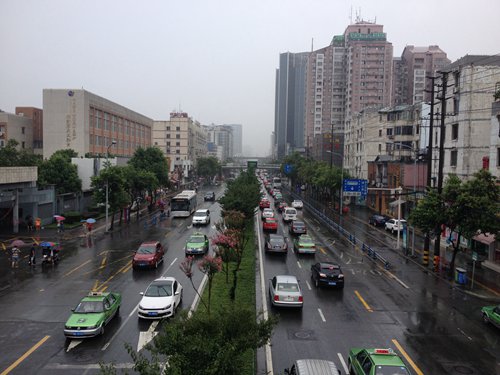
The opinions expressed do not represent the views of the China Daily website.
[Please click here to read more My Chengdu Story. You are welcome to share your Chengdu stories with China Daily website readers. Please send your story to chengdu2016@chinadaily.com.cn]
- Activists want dog festival taken off the menu
- 'Exotic names' will soon vanish
- Chinese 'parachute kids' flock to US
- Chinese writer wins top prize for authors of children's books
- Li: Tax reform to boost vitality of real economy
- Once-endangered pony makes comeback
- Xi's meeting with Obama 'eases tensions'
- Signs in Chinese would help France attract more visitors
- Bookshop worms way into community
- Chinese eye eco-burials as graveyards fill up
